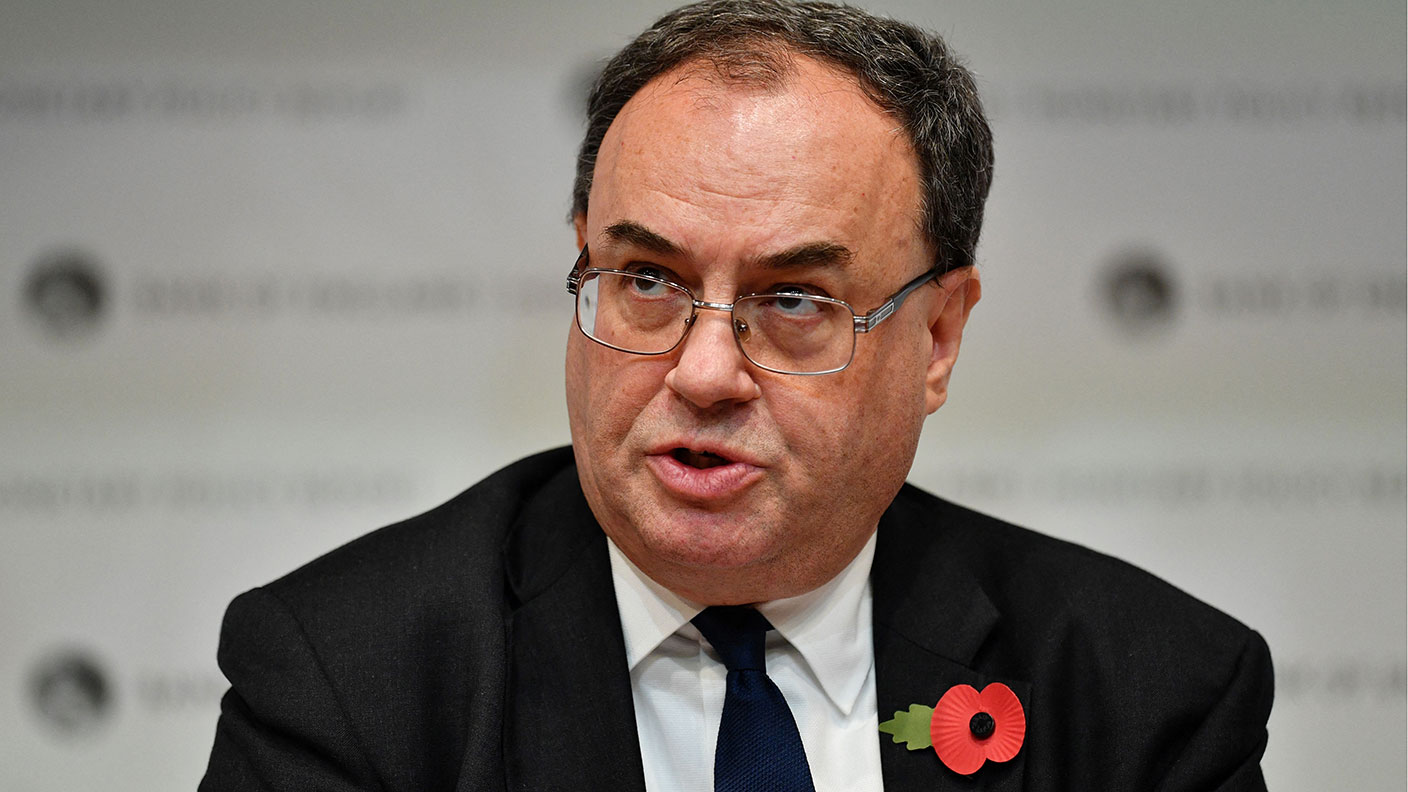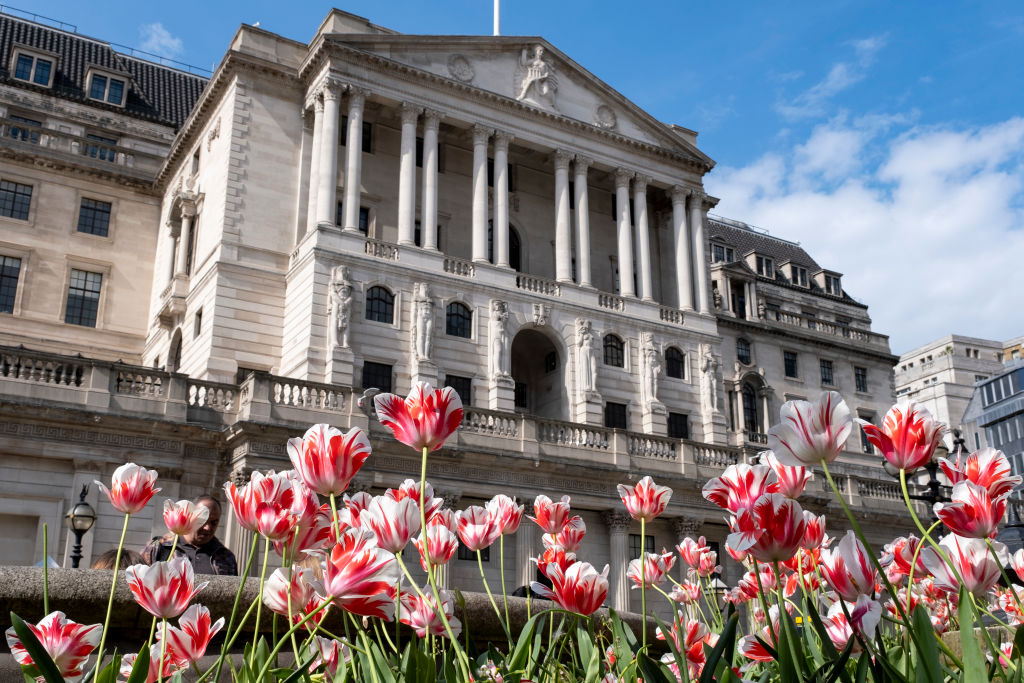The Bank of England gives markets a shock
Despite warning that it would have to act on inflation, the Bank of England has opted not to raise interest rates. John Stepek looks at the markets’ reaction and asks: what now?


Get the latest financial news, insights and expert analysis from our award-winning MoneyWeek team, to help you understand what really matters when it comes to your finances.
You are now subscribed
Your newsletter sign-up was successful
Want to add more newsletters?

Twice daily
MoneyWeek
Get the latest financial news, insights and expert analysis from our award-winning MoneyWeek team, to help you understand what really matters when it comes to your finances.

Four times a week
Look After My Bills
Sign up to our free money-saving newsletter, filled with the latest news and expert advice to help you find the best tips and deals for managing your bills. Start saving today!
In the middle of last month, Bank of England governor Andrew Bailey warned – sternly enough to make headlines – that “we will have to act” on inflation.
Markets rapidly priced in an immediate rate rise in November. Headlines suddenly sprung up panicking about what it meant for the housing market. Sterling shot higher in anticipation of the virtually-certain rate hike to come.
So when midday came yesterday and the Bank revealed that rates would stay right where they were, at 0.1% – well, markets were understandably a little surprised.
MoneyWeek
Subscribe to MoneyWeek today and get your first six magazine issues absolutely FREE

Sign up to Money Morning
Don't miss the latest investment and personal finances news, market analysis, plus money-saving tips with our free twice-daily newsletter
Don't miss the latest investment and personal finances news, market analysis, plus money-saving tips with our free twice-daily newsletter
The Bank of England’s twitchy eyebrows
Bank of England governor Andrew Bailey is rapidly learning all about the power of the governor’s raised eyebrow when it comes to markets.
He – clearly inadvertently – gave markets the impression that a rate rise was 100% certain yesterday. Yet, as it turned out, the Monetary Policy Committee (MPC) – whose nine members vote on what to do with monetary policy every month or so – were pretty firmly against raising either interest rates or withdrawing quantitative easing (QE) any faster than planned.
They voted seven to two against raising rates, and six to three to continue with QE until it’s done (which is shortly, in any case).
Now, the Bank isn’t saying it won’t ever have to raise rates. Indeed, it keeps saying that in the coming months, an “increase in Bank Rate” will be needed “to return CPI inflation sustainably to the 2% target”.
But it’s also clear that the MPC thinks that rates won’t have to go as high as the market had been expecting ahead of the meeting. The Bank reckons that if rates hit 1% by the end of next year (as the market had forecast) then inflation would be back below 2% by the second half of 2024, which is not what the Bank wants.
In other words, it was all a lot more “dovish” than expected. As a result, sterling plunged, and market expectations for future rate rises fell sharply.
So what changed? Anything? I skimmed my way through the post-meeting press conference yesterday. A few things stood out.
One reason the Bank may have had for waiting is that we probably haven’t had a sufficiently clear view yet as to how the end of the furlough scheme might affect the employment data.
Another point is that the term “transitory” is pretty meaningless. It doesn’t refer to a time. It basically just means: “factors which we hope we can dismiss as temporary”. This implies that they can pull “transitory” out of the hat for as long and as often as they like.
The third point is connected to the one above. The big thing the Bank is worried about (or perhaps pinning its hopes on) is energy prices. On several occasions, it made the point that inflation is really pretty dependent on what happens to energy prices.
So really, the message is “steady as she goes”. From an investment point of view, the message is also “don’t expect your savings rate to go up any time soon”. Financial repression will continue.
Central banks can’t control inflation – they just got lucky
There’s a bigger point here. It’s not necessarily an easy one to digest but I think it’s worth raising so we can mull it over in future articles.
There’s a great deal of logic to the points made by various central bankers. What can higher interest rates do to curb high oil prices? After all, in terms of spending, higher oil prices effectively act as a tax on consumers – if you need to spend more on petrol, that bites into your disposable income.
And what can higher interest rates do to deal with supply chain problems? I mean, yes, you can artificially choke off demand to an extent, but is that really productive in the circumstances, particularly as you can argue that the higher demand goes, the more incentive suppliers have to sort it all out?
So, in lots of ways, central banks can’t really do anything about inflation – at least, certainly not in the “fine tuning” sense that we’ve grown accustomed to in recent decades.
But once you go down that route, you have to start thinking: well, what’s the point of them then?
When inflation breaks out, it’s always transitory. The 1970s is associated with soaring oil prices. There was nothing central banks could do about that. But inflation stuck around.
Yes, you can argue that this was due to higher wages and higher levels of unionisation. But again – what’s that got to do with central bankers? A changing political atmosphere (and the shifting economics of energy supply) is what did for the unions, not central bankers.
What can central banks do?
In extremis, they can underpin the financial system, acting as lender of last resort – bailing out the banks, basically. That stops financial crises from turning into depressions.
At the other end of the scale, they can impose recessions by raising interest rates to painful levels. That’s what Paul Volcker did in the early 1980s, with the Federal Funds rate hitting 20% in 1981 (though note that inflation peaked more than a year before that, at just under 15%).
Other than that, inflation and disinflation are dictated by external forces. Why has inflation been low and falling in the last three decades? Because the global labour force grew explosively, while technology – the internet, largely – relentlessly drove down prices.
The first factor is over. And by the looks of it, unless we unlock fusion power any time soon, so is the second. So central banks have ridden a wave of disinflation and effectively squandered the benefits by using a 2% inflation target – plucked largely from thin air – to justify propping up asset prices.
And if this is the case, then all that central banks are really good for is distorting prices and thus driving the misallocation of capital. In other words, they’re serial bubble blowers. You have to admit, that fits the evidence of the last 30-odd years pretty well compared to other theories.
So what’ll happen now that we’re in a more inflationary environment? Honestly, I think the focus will remain on the asset-price-propping function until it’s no longer politically defensible to do so. Judging by yesterday’s surprise, that day is still a while from arriving.
Want to know more? Subscribe to MoneyWeek today and get your first six issues free. This is a subject that will run and run.
Get the latest financial news, insights and expert analysis from our award-winning MoneyWeek team, to help you understand what really matters when it comes to your finances.

-
 Should you buy an active ETF?
Should you buy an active ETF?ETFs are often mischaracterised as passive products, but they can be a convenient way to add active management to your portfolio
-
 Power up your pension before 5 April – easy ways to save before the tax year end
Power up your pension before 5 April – easy ways to save before the tax year endWith the end of the tax year looming, pension savers currently have a window to review and maximise what’s going into their retirement funds – we look at how
-
 Why Scotland's proposed government bonds are a terrible investment
Why Scotland's proposed government bonds are a terrible investmentOpinion Politicians in Scotland pushing for “kilts” think it will strengthen the case for independence and boost financial credibility. It's more likely to backfire
-
 How have central banks evolved in the last century – and are they still fit for purpose?
How have central banks evolved in the last century – and are they still fit for purpose?The rise to power and dominance of the central banks has been a key theme in MoneyWeek in its 25 years. Has their rule been benign?
-
 UK to have highest inflation among advanced economies this year and next, says IMF
UK to have highest inflation among advanced economies this year and next, says IMFThe International Monetary Fund (IMF) says it expects inflation to remain high in the UK, while lowering economic growth forecasts for 2026.
-
 Is Britain heading for a big debt crisis?
Is Britain heading for a big debt crisis?Opinion Things are not yet as bad as some reports have claimed. But they sure aren’t rosy either, says Julian Jessop
-
 'Britain is on the road to nowhere under Labour'
'Britain is on the road to nowhere under Labour'Opinion Britain's economy will shake off its torpor and grow robustly, but not under Keir Starmer's leadership, says Max King
-
 'Governments are launching an assault on the independence of central banks'
'Governments are launching an assault on the independence of central banks'Opinion Say goodbye to the era of central bank orthodoxy and hello to the new era of central bank dependency, says Jeremy McKeown
-
 Why investors can no longer trust traditional statistical indicators
Why investors can no longer trust traditional statistical indicatorsOpinion The statistical indicators and data investors have relied on for decades are no longer fit for purpose. It's time to move on, says Helen Thomas
-
 Live: Bank of England holds UK interest rates at 4.5%
Live: Bank of England holds UK interest rates at 4.5%The Bank of England voted to hold UK interest rates at their current level of 4.5% in March, as widely anticipated, after inflation rose to 3% in January